课件 should 与 shouldn't用法
- 格式:ppt
- 大小:988.00 KB
- 文档页数:7
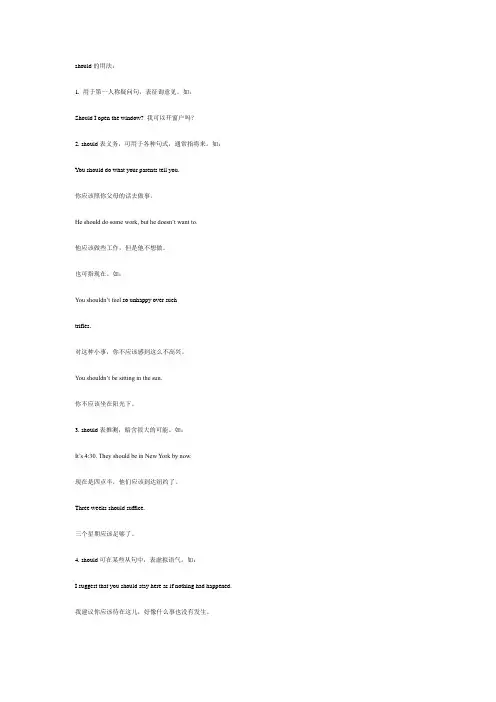
should的用法:1. 用于第一人称疑问句,表征询意见。
如:Should I open the window? 我可以开窗户吗?2. should表义务,可用于各种句式,通常指将来。
如:You should do what your parents tell you.你应该照你父母的话去做事。
He should do some work, but he doesn’t want to.他应该做些工作,但是他不想做。
也可指现在。
如:You shouldn’t feel so unhappy over suchtrifles.对这种小事,你不应该感到这么不高兴。
You shouldn’t be sitting in the sun.你不应该坐在阳光下。
3. should表推测,暗含很大的可能。
如:It’s 4:30. They should be in New York by now.现在是四点半,他们应该到达纽约了。
Three weeks should suffice.三个星期应该足够了。
4. should可在某些从句中,表虚拟语气。
如:I suggest that you should stay here as if nothing had happened. 我建议你应该待在这儿,好像什么事也没有发生。
She was terrified lest they should go on talking about her.她感到害怕,唯恐他们再说她的事。
If he should drop in, give him my message.他若来访,就将我的消息给他。
5. should表感情色彩,常用在以why, how开头的疑问句中。
如:Why shouldn’t you invite him?为什么你不邀请他?I don’t see why we shouldn’t make friends.我不明白为什么我们竟不能成为朋友。
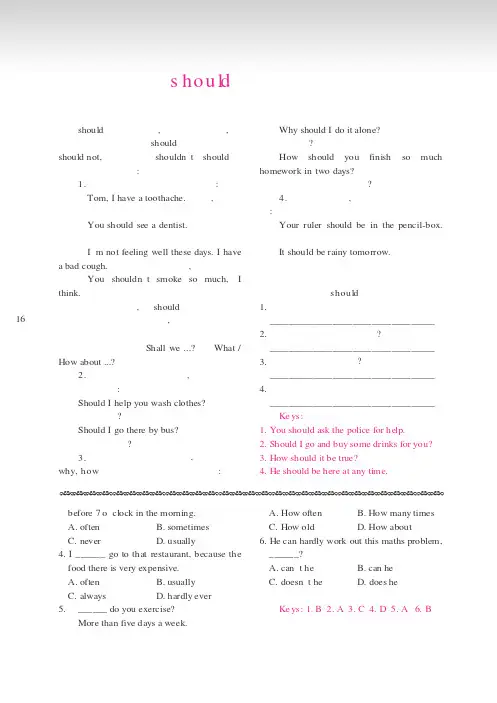
before 7o ’clock in the morning.A.often B.sometimes C.never ually 4.I ______go to that restaurant,because the food there is very expensive.A.often ually C.always D.hardly ever 5.—______do you exercise?—More than five days a week. A.How often B.How many times C.How old D.How about 6.He can hardly work out this maths problem,______?A.can ’t he B.can he C.doesn ’t he D.does he Ke ys:1.B 2.A 3.C 4.D 5.A 6.B should 属情态动词,后接动词原形,没有人称和数的变化。
should 的否定形式为should not,通常缩写为shouldn ’t 。
should 有以下几种常见用法:1.用于提出建议劝告别人。
例如:—Tom,I have a toothache.汤姆,我牙痛。
—You should see a dentist.你应当去看牙医。
—I ’m not feeling well these days.I have a bad cough.这些天我身体不适,老是咳嗽。
—You shouldn ’t smoke so much,I think.我认为你不该抽这么多烟。
需要注意的是,用should 提建议通常含有命令、批评、责备等语气,多用于熟人或朋友之间。
对上级、长辈或陌生人提建议最好使用语气委婉的Shall we ...?或What /How about ...?等句式。
2.用于第一人称疑问句中,用于征求对方意见。
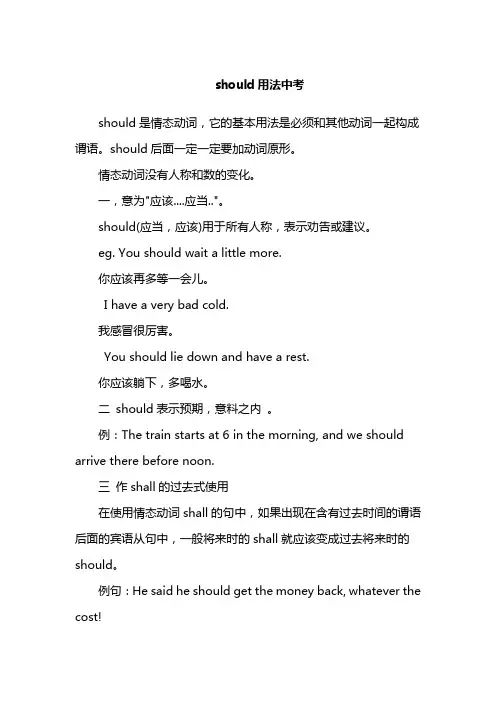
should用法中考should是情态动词,它的基本用法是必须和其他动词一起构成谓语。
should后面一定一定要加动词原形。
情态动词没有人称和数的变化。
一,意为"应该....应当.."。
should(应当,应该)用于所有人称,表示劝告或建议。
eg. You should wait a little more.你应该再多等一会儿。
I have a very bad cold.我感冒很厉害。
You should lie down and have a rest.你应该躺下,多喝水。
二should表示预期,意料之内。
例:The train starts at 6 in the morning, and we should arrive there before noon.三作shall的过去式使用在使用情态动词shall的句中,如果出现在含有过去时间的谓语后面的宾语从句中,一般将来时的shall就应该变成过去将来时的should。
例句:He said he should get the money back, whatever the cost!他说他一定要把钱弄回来,不管付出多少代价。
四表推测It should be a nice day tomorrow.明天应该是个好天气。
He should be home by now.他现在应该在家。
should没有人称和数的变化,其后跟动词原形。
如:You should see a doctor at once.She should take more exercise.We / They should drink milk every day.should的否定式是在should后面加not,可以缩写为shouldn’t,意为“不应当;不应该”。
如:You should not / shouldn’t work on the computer all day.含有should的一般疑问句是将should提至主语前;其简略回答分别为“Yes,主语(人称代词)+should.”和“No,主语(人称代词)+shouldn’t.”。
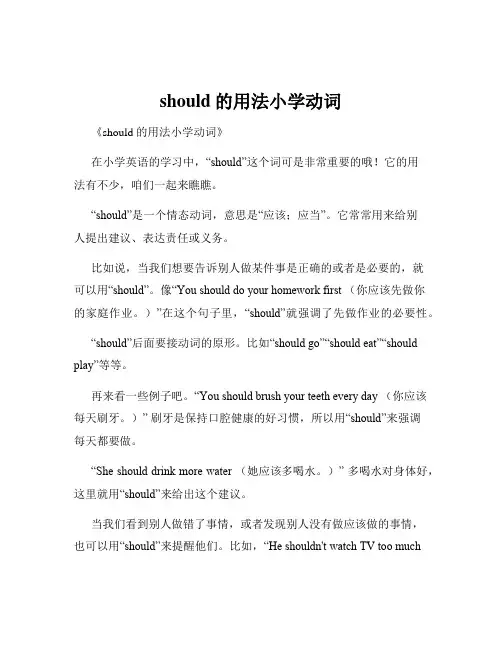
should的用法小学动词《should 的用法小学动词》在小学英语的学习中,“should”这个词可是非常重要的哦!它的用法有不少,咱们一起来瞧瞧。
“should”是一个情态动词,意思是“应该;应当”。
它常常用来给别人提出建议、表达责任或义务。
比如说,当我们想要告诉别人做某件事是正确的或者是必要的,就可以用“should”。
像“You should do your homework first (你应该先做你的家庭作业。
)”在这个句子里,“should”就强调了先做作业的必要性。
“should”后面要接动词的原形。
比如“should go”“should eat”“should play”等等。
再来看一些例子吧。
“You should brush your teeth every day (你应该每天刷牙。
)” 刷牙是保持口腔健康的好习惯,所以用“should”来强调每天都要做。
“She should drink more water (她应该多喝水。
)” 多喝水对身体好,这里就用“should”来给出这个建议。
当我们看到别人做错了事情,或者发现别人没有做应该做的事情,也可以用“should”来提醒他们。
比如,“He shouldn't watch TV too much(他不应该看太多电视。
)” 这里“shouldn't”是“should not”的缩写形式,表示“不应该”,提醒他看电视太多是不好的。
“should”还可以用在疑问句中呢。
比如,“Should I go to school today? (我今天应该去上学吗?)” 这时候就是在询问别人自己是否应该做某件事。
在回答“should”开头的疑问句时,常用“Yes, you should (是的,你应该。
)”或者“No, you shouldn't (不,你不应该。
)”小朋友们在使用“should”的时候,要注意根据具体的语境和想要表达的意思来用哦。
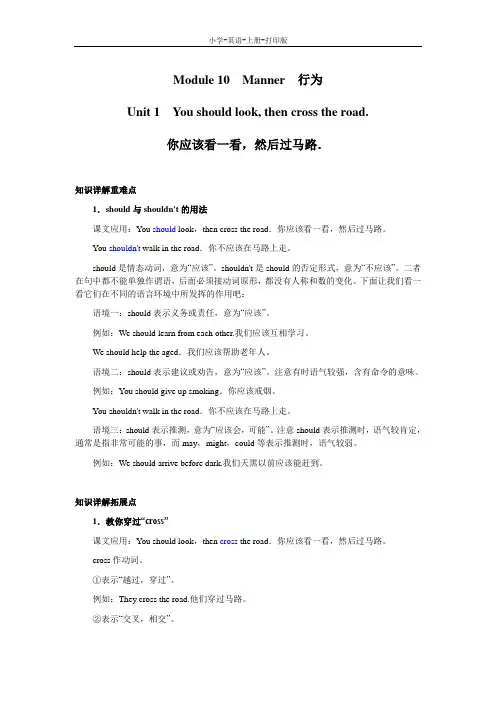
Module 10 Manner 行为Unit 1 You should look, then cross the road.你应该看一看,然后过马路.知识详解重难点1.should与shouldn't的用法课文应用:You should look,then cross the road.你应该看一看,然后过马路。
You shouldn't walk in the road.你不应该在马路上走。
should是情态动词,意为“应该”。
shouldn't是should的否定形式,意为“不应该”。
二者在句中都不能单独作谓语,后面必须接动词原形,都没有人称和数的变化。
下面让我们看一看它们在不同的语言环境中所发挥的作用吧:语境一:should表示义务或责任,意为“应该”。
例如:We should learn from each other.我们应该互相学习。
We should help the aged.我们应该帮助老年人。
语境二:should表示建议或劝告,意为“应该”。
注意有时语气较强,含有命令的意味。
例如:You should give up smoking.你应该戒烟。
You shouldn't walk in the road.你不应该在马路上走。
语境三:should表示推测,意为“应该会,可能”。
注意should表示推测时,语气较肯定,通常是指非常可能的事,而may,might,could等表示推测时,语气较弱。
例如:We should arrive before dark.我们天黑以前应该能赶到。
知识详解拓展点1.教你穿过“cross”课文应用:You should look,then cross the road.你应该看一看,然后过马路。
cross作动词。
①表示“越过,穿过”。
例如:They cross the road.他们穿过马路。
②表示“交叉,相交”。
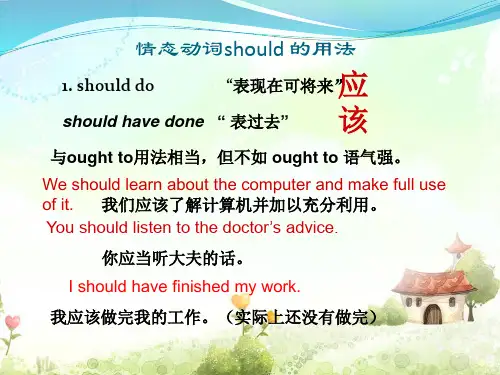
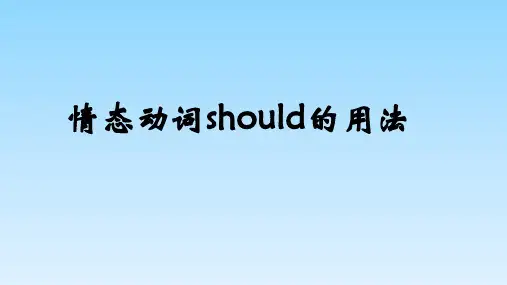
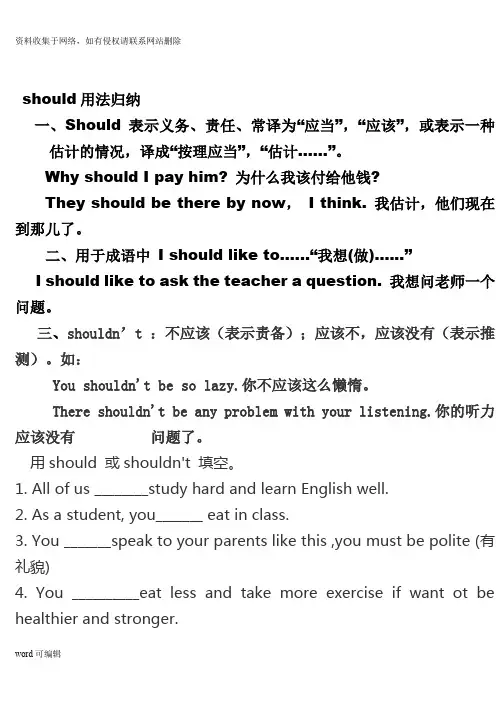
should用法归纳一、Should 表示义务、责任、常译为“应当”,“应该”,或表示一种估计的情况,译成“按理应当”,“估计......”。
Why should I pay him? 为什么我该付给他钱?They should be there by now,I think. 我估计,他们现在到那儿了。
二、用于成语中I should like to......“我想(做)......”I should like to ask the teacher a question. 我想问老师一个问题。
三、shouldn’t :不应该(表示责备);应该不,应该没有(表示推测)。
如:You shouldn't be so lazy.你不应该这么懒惰。
There shouldn't be any problem with your listening.你的听力应该没有问题了。
用should 或shouldn't 填空。
1. All of us ________study hard and learn English well.2. As a student, you_______ eat in class.3. You _______speak to your parents like this ,you must be polite (有礼貌)4. You __________eat less and take more exercise if want ot be healthier and stronger.5. My mother is very tired after work, I________ do some housework for her.had better(常简略为'd better)是一固定词组,had better"最好",用于表示对别人的劝告、建议或表示一种愿望。

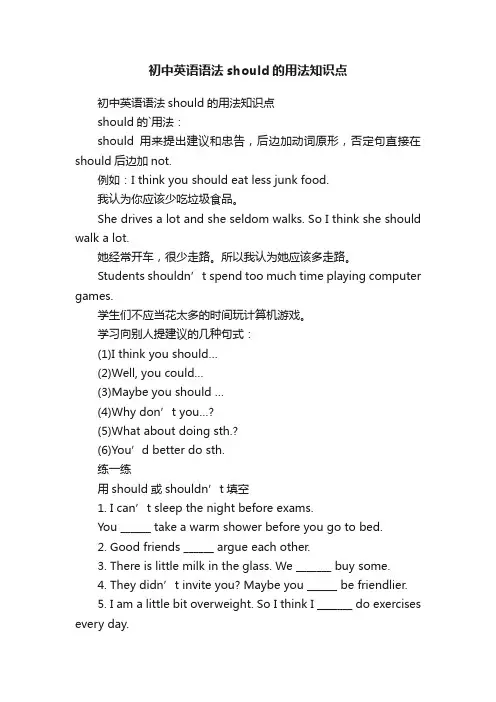
初中英语语法should的用法知识点初中英语语法should的用法知识点should的`用法:should用来提出建议和忠告,后边加动词原形,否定句直接在should后边加not.例如:I think you should eat less junk food.我认为你应该少吃垃圾食品。
She drives a lot and she seldom walks. So I think she should walk a lot.她经常开车,很少走路。
所以我认为她应该多走路。
Students shouldn’t spend too much time playing computer games.学生们不应当花太多的时间玩计算机游戏。
学习向别人提建议的几种句式:(1)I think you should…(2)Well, you could…(3)Maybe you should …(4)Why don’t you…?(5)What about doing sth.?(6)You’d better do sth.练一练用should或shouldn’t填空1. I can’t sleep the night before exams.You ______ take a warm shower before you go to bed.2. Good friends ______ argue each other.3. There is little milk in the glass. We _______ buy some.4. They didn’t invite you? Maybe you ______ be friendlier.5. I am a little bit overweight. So I think I _______ do exercises every day.答案:1. should 2. shouldn’t 3. should 4. should 5. should 【初中英语语法should的用法知识点】。
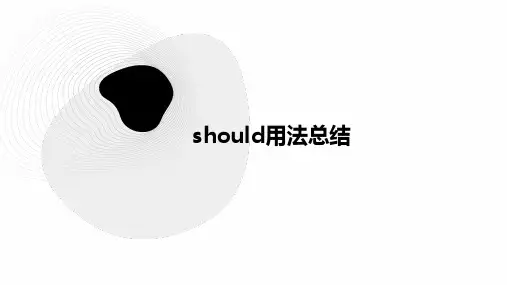
应该和不应该的用法应该和不应该是英语中经常使用的情态动词,用来表示建议、义务、必要性、必然性等概念。
正确地使用should和shouldn't对于学习英语的人来说是非常重要的,因为它们经常出现在日常交流和书面语言中。
本文将详细介绍should和shouldn't的用法,并提供一些例句来帮助读者更好地理解。
1. should的用法1.1 表示建议should常常用来表示建议或推荐的意思。
例如:You should see a doctor.(你应该去看医生。
)1.2 表示义务和必要性should也可以表示义务或者必要性。
例如:We should respect our elders.(我们应该尊敬我们的长辈。
)1.3 表示预期should可以表示某种预期或者预测。
例如:The weather should benice tomorrow.(明天天气应该很好。
)1.4 表示批评有时should也用来表示批评或者责备。
例如:You should have listened to me.(你本该听我的话。
)2. should的否定形式shouldn't的用法2.1 表示不应该shouldn't常用来表示不应该做某事。
例如:You shouldn't smoke in this area.(你不应该在这个区域吸烟。
)2.2 表示建议的否定shouldn't也可以用来表示否定的建议或推荐。
例如:You shouldn't skip breakfast.(你不应该不吃早餐。
)2.3 表示不可能实现的愿望shouldn't还可以表示不可能实现的愿望或期望。
例如:I shouldn't have said that.(我不该说那样的话。
)3. 应该注意的问题当使用should和shouldn't时,需要注意以下几点:3.1 主观性should和shouldn't常常带有一定的主观性,因此在使用时需要根据具体语境进行理解和判断。
小学英语语法情态动词should 及其否定式shouldn’t的用法目前我们学过的情态动词有can(could).may(might),will(would),shall(should), have o(had to).must 等,情态动词无人称和数的变化,不能单独使用,必须与其后的动词原形构成谓语。
情态动词should的用法是本单元的重点。
句子结构:should 意思是“应该、应当”,其句子结构是:,肯定句:主语+should+动词原形+其它部分。
如:we should keep quiet in the library. 我们在图书馆应该保持安静。
He should take some medicine at home. 他应该在家吃点药。
They should park their bikes under the tree. 他们应该把自行车停在树下。
2.否定句:主语+shouldn't+动词原形+其它部分。
如:We shouldn't make noise in the library. 我们在图书馆不应该发出声音。
He shouldn't take any medicine at home.他不应该在家吃药。
They shouldn't park their bikes under the tree. 他们不应该把自行车停在树下。
另外,由shouldn't引导的否定句,我们也可以用Don't 开头的否定祈使句来表达,区别是:Don't开头的否定祈使句语气更强烈。
如:You shouldn't eat or drink in the reading room. 你不应该在阅览室里吃喝。
同义句: Don't eat or drink in the reading room. 在阅览室里不要吃喝。
3.一般疑问句:Should+主语+动词原形+其它部分。
should的详细用法总结今天给大家带来should的用法,我们一起来学习吧,下面就和大家分享,来欣赏一下吧。
should的用法should是情态动词,它的基本用法是必须和其他动词一起构成谓语。
should后面一定一定要加动词原形。
情态动词没有人称和数的变化。
一,意为"应该....应当.."。
should(应当,应该)用于所有人称,表示劝告或建议。
eg. You should wait a little more.你应该再多等一会儿。
--- I have a very bad cold.我感冒很厉害。
--- You should lie down and have a rest.你应该躺下,多喝水。
二should表示预期,意料之内。
例:The train starts at 6 in the morning, and we should arrive there before noon.三作shall的过去式使用在使用情态动词shall的句中,如果出现在含有过去时间的谓语后面的宾语从句中,一般将来时的shall就应该变成过去将来时的should。
例句:He said he should get the money back, whatever the cost!他说他一定要把钱弄回来,不管付出多少代价。
四表推测It should be a nice day tomorrow.明天应该是个好天气。
He should be home by now.他现在应该在家。
should没有人称和数的变化,其后跟动词原形。
如:You should see a doctor at once.She should take more exercise.We / They should drink milk every day.should的否定式是在should后面加not,可以缩写为shouldn’t,意为“不应当;不应该”。
should和shouldn't的用法-回复Should和Shouldn't是用于表示建议、推荐、义务、期待、禁止、反对等情态动词。
它们在句子中起到了作用,帮助我们表达自己的观点和意见。
下面的文章将详细介绍should和shouldn't的用法,并提供一些例句来阐述这些用法。
应该注意的是,should和shouldn't的用法是主观的,往往依赖于个人、文化、语境和情景等因素。
因此,在使用should和shouldn't时,我们应该始终考虑到这些因素,并灵活运用这两个词来传达我们的意思。
一般而言,should用于表达建议、推荐、期待、义务和要求等方面,而shouldn't则用于表示反对、不赞成和禁止等方面。
1. 建议和推荐:在表达建议和推荐时,我们可以使用should来表达我们的意见,表示某事是明智、正确或值得去做的。
例如:- You should eat a healthy diet and exercise regularly to maintain good health.(你应该保持健康饮食并经常锻炼以保持良好的健康。
)- We should recycle to help protect the environment.(我们应该回收废物来帮助保护环境。
)2. 期待和义务:当我们希望某人做某事时,我们可以使用should来描述我们的期待和义务。
例如:- Students should complete their homework assignments on time. (学生们应该按时完成作业。
)- Employees should arrive at work punctually.(员工应该准时到达工作岗位。
)3. 禁止和反对:当我们不希望某人做某事,或者表示反对某种行为或观点时,我们可以使用shouldn't来表示反对。
例如:- You shouldn't smoke in public places.(你不应该在公共场所吸烟。